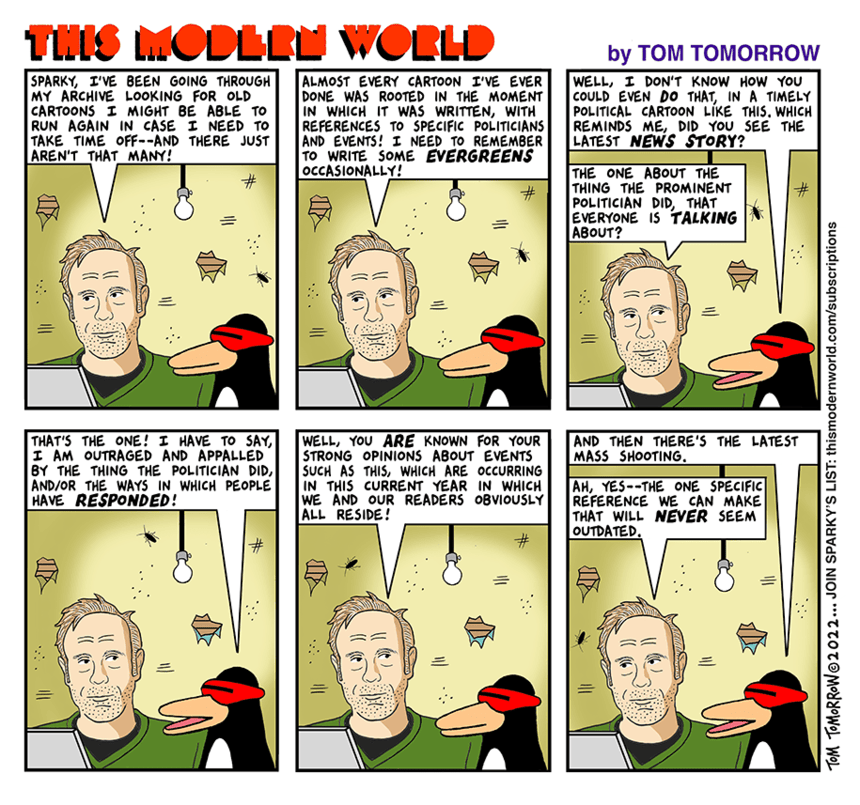
Tom Tomorrow reflects on the fleeting relevance of political cartoons, and he’s right that the more specific a critique, the sooner it becomes irrelevant, or, at least, we should hope it does.
I bought Herblock: The Life and Work of the Great Political Cartoonist, which includes a DVD of all his cartoons, and, while he was, indeed, one of the greats, I found a lot of his cartoons seemed limp because the crisis had passed and the moment been forgotten.
While, as Tom Tomorrow suggests, all the crises seem to blend together after awhile.
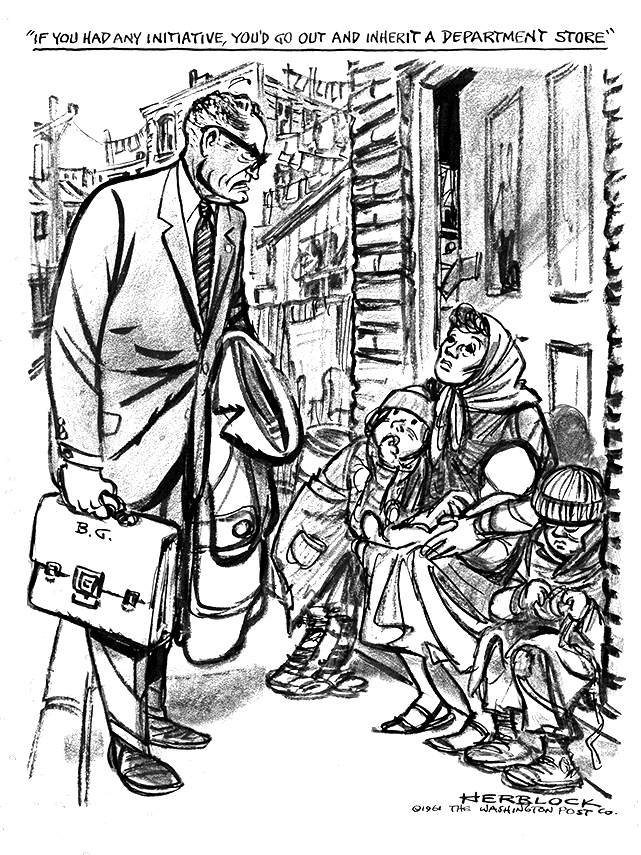
Though there are times when a specific criticism touches on an eternal problem, as with Herblock’s 1961 takedown on Goldwater’s lack of empathy with the poor.
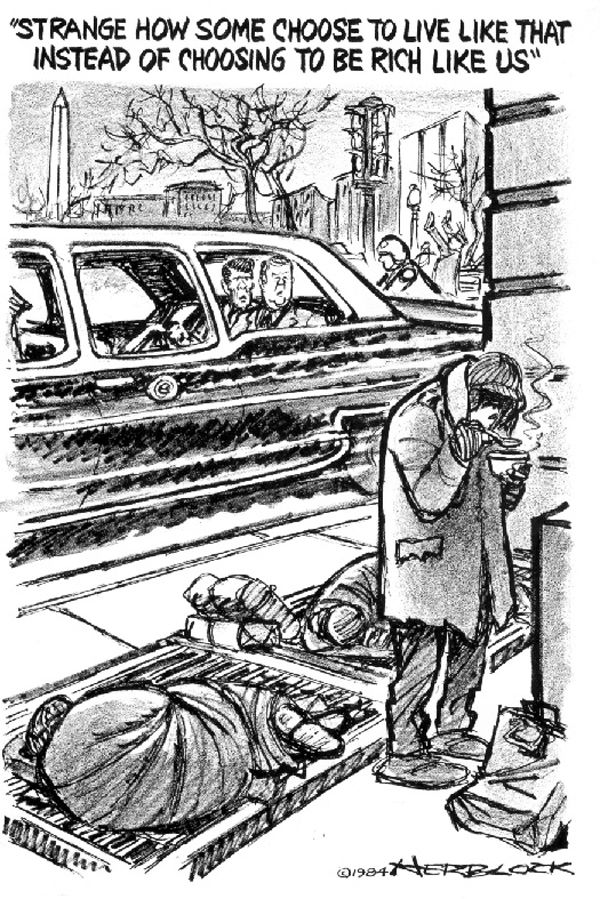
He was, you will note, able to touch on the same concept nearly a quarter of a century later, but that’s largely a reflection of our resilience to honorable behavior.
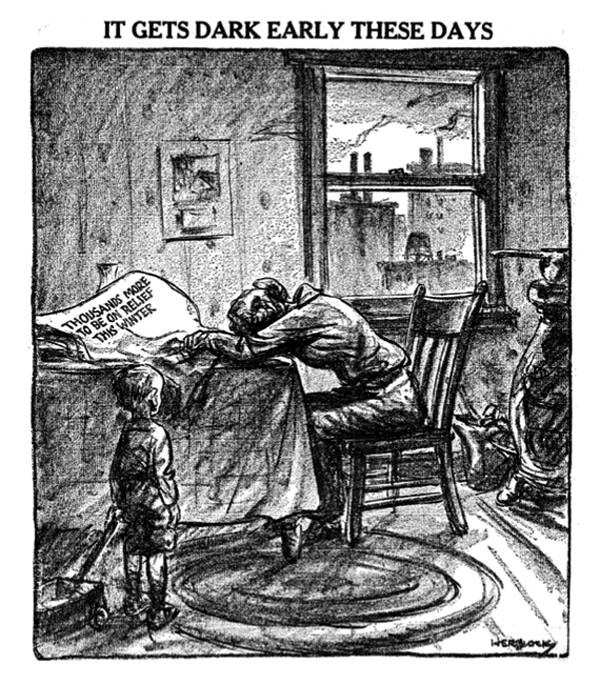
Though poverty was high on his list of priorities. He’d done this piece in 1934, as part of an annual fundraiser.
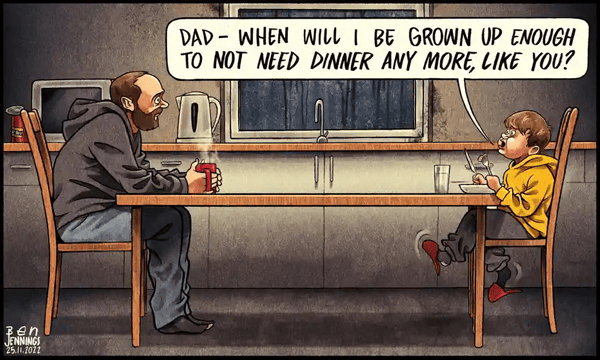
And it is certainly an evergreen topic, as seen in this Ben Jennings commentary on a report that parents in Britain were skipping meals in order to be able to feed their kids. It pairs nicely with Herblock’s 1934 appeal, because the despair of the parents in both not only emphasizes the need for people to step up and help, but makes it plain that, contrary to the cold-hearted dismissal of the Goldwaters and Reagans, poverty is not a conscious choice.
Though it’s important to note that, while Herblock may have seen Goldwater as not understanding the matter, it was Reagan who purposefully launched fables of “welfare queens” to divide Americans between the hardworking Archie Bunkers and the undeserving Bob Cratchits.

Bruce MacKinnon uses a familiar image to remind readers of the plight of the homeless at this time of year, and, while it’s true that poverty is a problem beyond the holidays, we’re not only entering the season of giving, but the season, as Herblock noted, when utility costs become a greater burden for those who have homes, while the cold itself is an overall threat to those who don’t.
The nativity story itself is an example of an enduring myth, being both one of the most folkloric parts of the New Testament and the most celebrated.
Much of the celebration is in self-indulgence rather than a rebirth of Christian caring, but there is seasonal pressure to toss a few coins in the beggar’s cup, in honor of the day.

Which calls for me to point out an error that helps people avoid giving all year long: Keith Knight is incorrect that stores are permitted to count customer donations as their own charitable contribution.
Whether it’s an ongong round-up program, one of those seasonal things of buying a construction paper shamrock or heart or whatever to stick on the store windows, or just a can on the counter for charitable change, the store gets no tax benefit.
Aside from how someone living on Social Security views gripes about the price of goat cheese, oat milk and imported walnuts, there’s the issue of spending that kind of cash but begrudging the 45 cents.
Our coop’s round-up program hit the one million dollar mark last spring, but I’ve seen people round up 95 cents on a $12.05 purchase and others with three figure totals declining to round up a dime.
It’s not about the money.
It’s never been about the money.
Juxtaposition of the Day
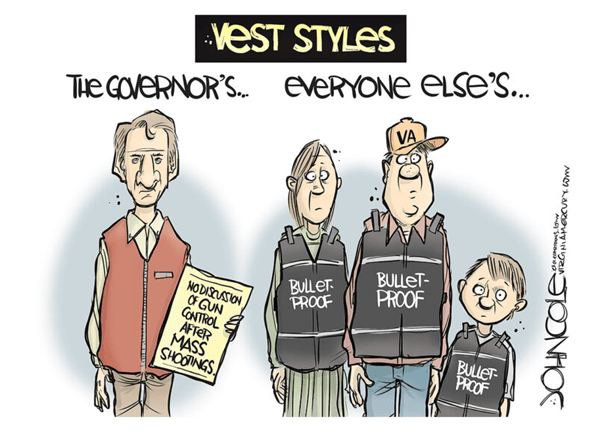
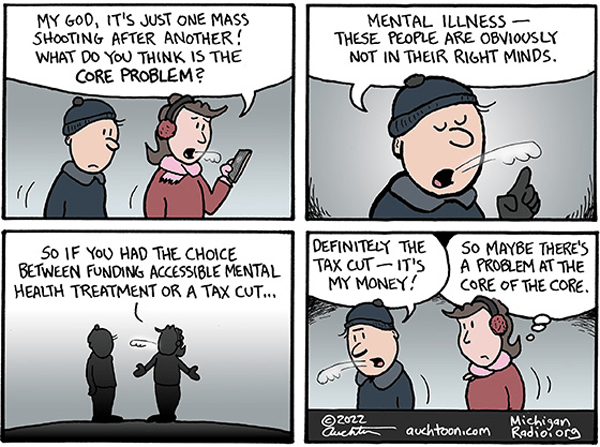
Cole notes Virginia Governor Glenn Youngkin’s refusal to discuss guns in the wake of two recent mass shootings in his state, instead, as in Auchter’s more overall observation, blaming the problem on mental illness.
To be fair, Youngkin is looking to increase mental health funding in the state’s next budget, but that’s like handing out AA brochures in a barroom: The people who should take one are the least likely to do so.
For all the “He seemed like a normal guy” interviews in the wake of these shootings, there are far more in which family members say they begged the shooter to get help, or in which — as in the Walmart shootings in Virginia — people had reported the shooter as dangerous before it became deadly.
The ones who most need help won’t accept it.
Meanwhile, the shooter in Colorado Springs had been reported to police for bomb threats and an armed standoff, but El Paso County had passed a measure refusing to be part of the state’s Red Flag system.
Bless their hearts.
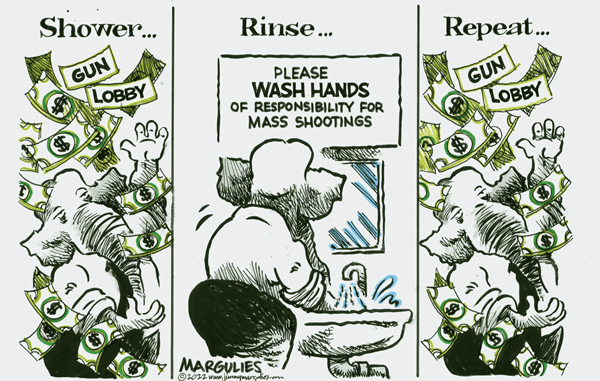
Jimmy Margulies (KFS) cuts to the chase, emphasizing Tom Tomorrow’s point that this is one story that will neither change nor go away, at least as long as SCOTUS considers the purchase of politicians to be protected as Free Speech and insists that Madison was joking when he tied the right to own guns to a need for well-regulated state militias.

And, by the way, I think Gary Varvel (Creators) got Kyle Rittenhouse’s hair color wrong.

You’ll shoot your eye out, kid.
While I’m complaining …

I saw someone griping this morning that the Fed’s plan to raise rates again is tantamount to demanding layoffs, and it’s true that Jerome Powell has said that higher unemployment, or, at least, lower salaries, would ease inflation.
But as noted in Alex, the layoffs appear to be happening higher up the ladder than usual, not just on Twitter but throughout, in particular, the entertainment industry, where streaming revenues have not made up for loss of cable royalties, nor paid for the necessary infrastructure they require.
The joke here is that there’s no joke. I was at a paper that offered buyouts, which not only yielded them a few voluntary cuts up to the number of buyouts available, but — given how many applied after the buyouts were gone — provided management with a list of people who would probably quit if sufficiently harassed.
I walked around with a target on my forehead for about four months. Once I bailed, they replaced me with a part-timer.
Same tactic as in Alex.

Had a little Daryl Hannah flashback when I saw this Vintage Thimble Theater (KFS), remembering when we were grooming our children to have sex with fish.
“There’s nothing that has a shorter shelf life than an angry cartoon about presidents.” (Art Spiegelman)
Maybe I am a curmudgeon, but I don’t ever round up at the grocery store.
I know nothing about the charity they are donating to, and I have my own list of favorite charities (including the local food bank) that I give to, plus I can then take the deduction on my income tax.
I’m good with rounding up and/or scanning the donation card at the co-op, but I don’t want to do it at the big corporate grocery.
They may not get a tax deduction, but they do get a nice PR boost for their “community giving”
The problem with the chains, for those of us in rural small towns, is that the charity is rarely local. The coop is transparent in who’s getting the money, and it stays in our community.
Though I was at Town Meeting in a small Maine town once when one of the budget items was a request for $250 from a homeless shelter in Portland, 100 miles away. People strongly questioned it, but the moderator said it was because a local resident had used the facility.
There was a pause while everyone mumbled to each other, because they all knew who it surely had been. The line item passed easily.
Transparency matters.
I always wondered about the rounding up and the tax deduction. Thank you for the link. The PR aspect still gives me pause though.
Apparently I’ve been added to some sort of “Easy Mark” list for charitable donations. This time of year I am constantly snowed under by a blizzard of snail mail asking me to contribute to Teddy Bears for Cops, or water wings for the homeless, or whatever anyone thinks is worth the price of the bulk-mail stamp to get it to me.
What’s wrong with letting people know your business is making an effort to be helpful? Would this also mean airports shouldn’t put out recycling bins for fear of looking good?
I think Varvel was going for Ralphie rather than Rittenhouse.